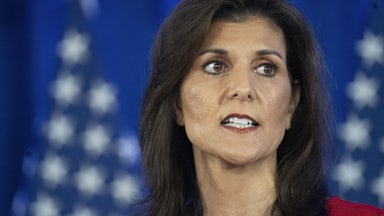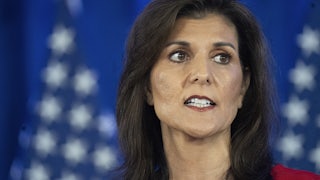Two weeks ahead of parliamentary elections, Poland’s split-screen political reality was on stark display. On October 1 in Warsaw, the main opposition group, Civic Coalition, led a rally dubbed the “March of a Million Hearts.” The march drew the biggest crowds since the Solidarity trade union rallied against communism in the late 1980s, bringing the center of the capital to a standstill. Civic Coalition leader Donald Tusk vowed to end what he called “the Polish-Polish war” stoked by the ruling populist party, Law and Justice, or PiS, depicting the opposition as traitors.
Simultaneously, PiS held its own gathering in the coal-mining capital of Katowice. At the party convention, speaker after speaker denounced Tusk, characterizing him as a German stooge. Deputy Prime Minister Jarosław Kaczyński, the de facto leader of PiS, said that under Tusk’s last term as prime minister, from 2007 to 2014, “Poland was subordinated to external forces, two in particular: Germany and Russia.”
Like Donald Trump in the United States and Brexiteers in the U.K., populists have polarized Poland. Since legitimately winning presidential and parliamentary elections in 2015, PiS has subverted the independent judiciary; turned public television, TVP, into a Fox News–style propaganda organ; and passed draconian anti-abortion laws. It has dubbed these policies “good change,” and Kaczyński has called Poles who take part in anti-government protests “Poles of the worst sort.”
Similar to recent elections in Hungary and Turkey, PiS is attempting to tilt the scales ahead of the October 15 election, in vying for an unprecedented third term in Parliament. Ahead of the election, the government removed highway tolls, state energy giant Orlen cut its prices at the pump, and the central bank lowered interest rates by 0.75 percent. It is holding a referendum on the same day as the election, asking voters four loaded questions, such as: “Do you support the admission of thousands of illegal immigrants from the Middle East and Africa, in accordance with the forced relocation mechanism imposed by the European bureaucracy?”
While PiS has staked out right-wing positions on cultural issues, its social welfare policies are decidedly left-wing. Its centerpiece policy is a child benefit called “Family 500+,” giving 500 zlotys ($115) per month to parents with children under the age of 18, regardless of income. PiS has vowed to raise it to 800 zlotys ($184) in 2024. It has increased pensions, lowered the retirement age, made medicine free for young and old, and by January 2024 will have more than doubled the minimum wage since taking power. Initially, the opposition argued that these policies were unaffordable, but now it supports them. In addition, Tusk said he does not support increasing the retirement age after his previous government raised it to 67.
According to Politico’s Poll of Polls, PiS leads Civic Coalition by 36 percent to 30 percent. Neither party is likely to win an absolute majority, forcing either to join with smaller party coalitions. Since 2015, PiS has held an absolute majority with no coalition partners in the main legislative chamber, known as the Sejm, which no other party has achieved since Poland transitioned to democracy in 1989. While the opposition won control of the Senate in 2019, it is a much weaker body than the 460-seat Sejm, where PiS currently holds 235 seats.
If it needs to form a coalition, PiS would likely join with Konfederacja, a libertarian, nationalist, and anti-Ukrainian grouping. Although Civic Coalition has not altogether ruled out an alliance with Konfederacja, it is more likely to join with two coalitions, The Left and Third Way, which it has thus far failed to unite into an opposition bloc. Much of the outcome depends on whether the smaller factions, all of which poll around 9 or 10 percent, do ultimately reach their electoral thresholds of 8 percent to enter Parliament.
On a recent afternoon, Adam Adamczyk, 38, a city councilor in Brwinów, a small town outside Warsaw, said it was hard for him as a Civic Coalition member to reach people in the pro-government media bubble. He said that some people who support PiS and watch TVP either refuse to speak with him or insult and scream at him. Others were more amenable: “Sometimes, what I can show them and what I can tell them makes them think that there can be something different,” he said. While Civic Coalition has focused on rallying crowds in big cities, Adamczyk called for focusing on rural voters: “I believe that the one and only thing [we] can do is to try to get to [PiS supporters] directly: to visit all the small towns and villages.”
However, PiS has already been focusing on voters in the countryside. In September, Poland blocked grain exports from Ukraine after Russia pulled out of the Black Sea grain deal and the European Commission let its own restrictions end. While talks between Ukraine and Poland remain ongoing, Warsaw is only allowing the transit of a few Ukrainian commodities. Two wheat farmers from Koszajec, a small town near Warsaw, complained about prices falling after cheap Ukrainian imports became stuck in Poland as a result of the Black Sea dispute. Jan Jacek Oliszewski, 55, said: “This is a big, big, issue because it impacted the price of wheat.” He added that the wheat price decreased by almost half, while production costs rose. Mieczysław Pękala, 65, said: “We want to support Ukraine, but our colleagues are losing a lot thanks to this transport from Ukraine.” Both declined to say how they would vote.
At the same time, big cities whose residents vote for Civic Coalition have gotten far less attention and money. Magdalena Młochowska, coordinator for the city-run Green Warsaw program, which seeks to improve air quality, said that her budget had been cut because of PiS changes to tax laws: “This policy is clever, from the current government’s point of view, because the people who vote for them live in the smaller cities, so they transfer proportionally more [EU] money to these towns. They never win [at] the polls in the biggest cities. Never.”
Even if the opposition does prevail, PiS will still control the judiciary and the presidency: The ruling party has appointed all of the sitting members of the Constitutional Tribunal, who serve nine-year terms, and President Andrzej Duda is in office until 2025 and has veto power. This makes Civic Coalition’s promised changes, like legalizing abortion in the first trimester, extremely difficult. The “Polish-Polish war” that Tusk spoke of would likely continue for several years.
If PiS wins, it would likely continue its path of remaking state institutions in the party image with the ironclad support of a rural base. In 2011, after losing parliamentary elections, party leader Kaczyński said: “One day, we will have Budapest in Warsaw,” referring to how Hungarian Prime Minister Viktor Orbán used his supermajority to create an illiberal system in a European democracy. Karolina Wigura, a historian and a board member of the Kultura Liberalna Foundation in Warsaw, said: “Poland is like a ‘zebra,’ which in recent years has displayed in turns both an authoritarian character and democratic remnants. If PiS wins a third term, then the stripes will wash out.”



![A young woman yells as she stands in front of several demonstrators holding banners that read "Emory admin: Opposing genocide [does not equal] antisemitism" and "End all U.S. aid to Israel."](http://images.newrepublic.com/d43ffdf6c824274713cc2fec629c64e86cafa503.jpeg?auto=format&fit=crop&crop=faces&q=65&w=384&h=undefined&ar=16%3A9&ixlib=react-9.0.2&w=384)
![A young woman yells as she stands in front of several demonstrators holding banners that read "Emory admin: Opposing genocide [does not equal] antisemitism" and "End all U.S. aid to Israel."](http://images.newrepublic.com/d43ffdf6c824274713cc2fec629c64e86cafa503.jpeg?auto=format&fit=crop&crop=faces&q=65&w=320&h=undefined&ar=16%3A9&ixlib=react-9.0.2&w=320)

